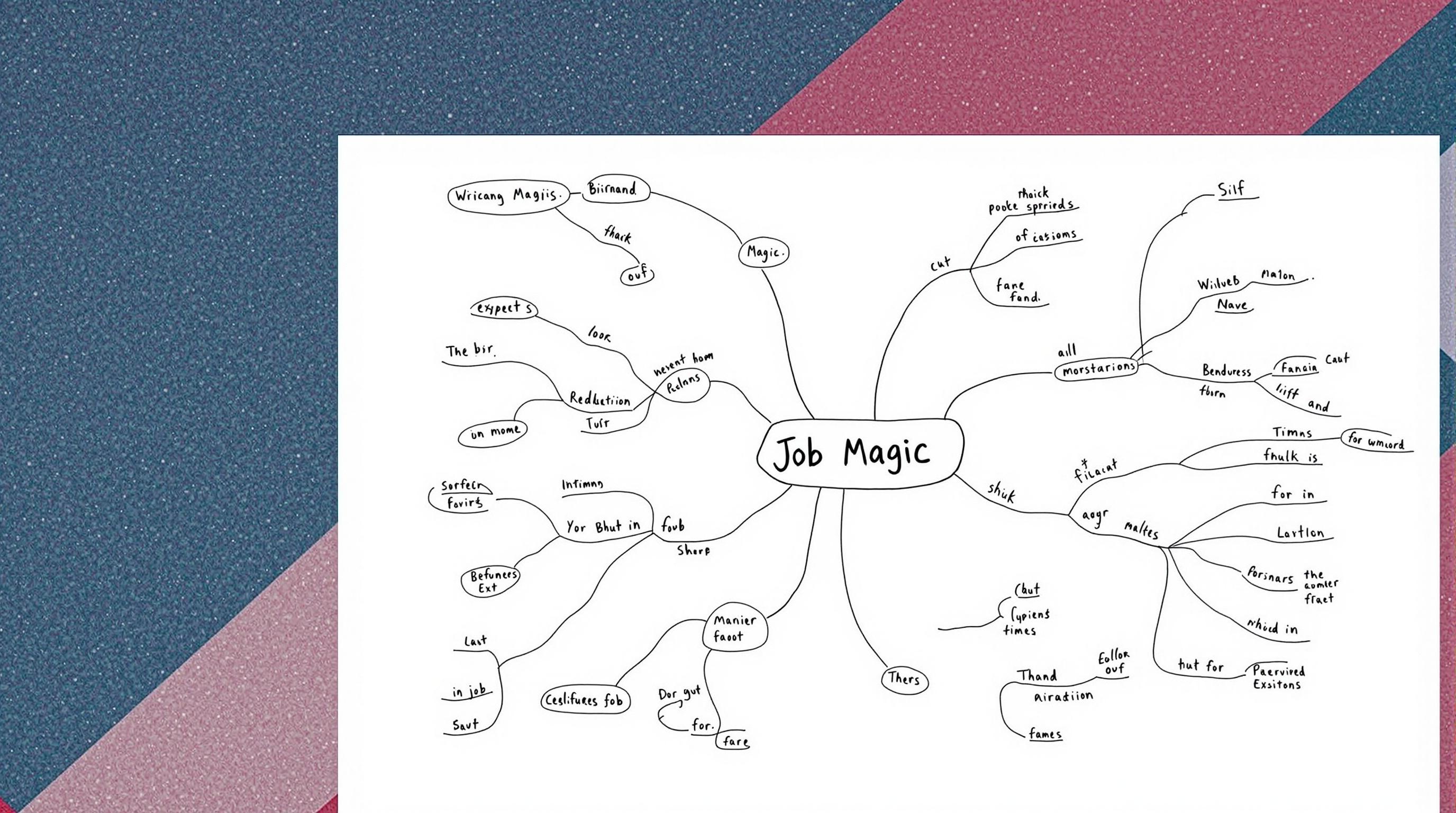Related Articles
- Navigating the Talent Labyrinth: How Emotional Intelligence Is Shaping New Hiring Practices in Unseen Markets
- Behind the Scenes: How Automating HR Processes Is Redefining the Future of Recruitment and Job-Seeking Strategies
- Beneath the Surface: Unveiling the Surprising Role of Environmental Sustainability in Shaping Future Careers
- Exploring the Quirky Side of Remote Work: How Hobbies Are Fueling Professional Success in Unexpected Ways
- How the Remote Revolution is Inspiring Unlikely Friendships Across Continents: A Study of Global Connectedness
- The Unforeseen Bond: How Virtual Coworking Spaces Foster Unexpected Connections Amidst Remote Work
Mind Mapping Magic: Use Visual Thinking Techniques to Transform Your Job Interview Approach
Mind Mapping Magic: Use Visual Thinking Techniques to Transform Your Job Interview Approach
Mastering your job interview technique can often be the key to landing your dream position. Mind mapping, a powerful visual thinking tool, can help you organize your thoughts, prepare compelling answers, and approach the interview with confidence.
What is Mind Mapping?
Mind mapping is an inventive visual thinking technique that allows individuals to organize information visually, enabling them to understand and recall complex topics better. Developed by Tony Buzan in the 1960s, mind mapping involves creating a diagram that visually represents words, ideas, tasks, or other concepts linked around a central topic.
The Science Behind Visual Thinking
Studies reveal that 65% of individuals are visual learners, meaning they grasp and retain information better when it’s presented visually. A report by the 3M Corporation suggests that visuals can improve understanding by up to 400%. In high-stakes situations like job interviews, where nerves can run high, employing techniques that enhance comprehension can be a game-changer.
How to Create Your Mind Map for Interviews
Creating a mind map for your job interview preparation solely involves a few steps. Start with a central idea: “My Job Interview.” From there, branch out into categories such as personal strengths, relevant experiences, anticipated questions, and even counterarguments for common weaknesses.
Use colors, symbols, and images to make it more engaging. Research showcases that adding color can increase retention by 20% compared to black and white notes. Just remember to keep it clear and concise.
Telling Your Story
Every candidate has a unique narrative that can bring them to life during interviews. Imagine your mind map illustrating not just your skills but also your journey: a winding road filled with triumphs, struggles, and learning experiences. If your map indicates that you somehow overcame a challenging project at your previous job, prepare to articulate that story effectively.
When Jacob, a now-successful tech entrepreneur, prepared for interviews post-college by mind mapping his experiences, each branch revealed stories of resilience and growth. With every interview, he shared these narratives, making him memorable to hiring managers.
What to Include in Your Interview Mind Map
Here’s a more detailed breakdown of sections you could explore within your mind map:
- Personal Strengths: List qualities, skills, and unique attributes.
- Relevant Experiences: Highlight roles, projects, or tasks that align directly with the job description.
- Anticipated Questions: Prepare answers to common interview questions such as "Tell me about yourself," and "Why should we hire you?"
- Questions for the Interviewer: Always be ready to fire back questions that show your interest in the company.
- Follow-up Strategy: Consider how you will express gratitude and reiterate your interest post-interview.
Transforming Weaknesses
Let’s be real; nobody is perfect. During an interview, the way you present your weaknesses can be crucial. With a mind map, you can visualize potential weaknesses and develop compelling narratives around them — how you've improved or learned from these areas.
For example, if time management is a weakness, you can outline ways you’ve tackled this issue, perhaps through time-blocking techniques or using productivity apps effectively. By turning a perceived deficit into an acknowledgment of growth, you put a positive spin on your self-assessment.
The Importance of Practice
Once your mind map is complete, you’ll want to practice articulating your responses. Research suggests that practicing boosts confidence and reduces anxiety. A study by the American Psychological Association reported that rehearsal can enhance performance by up to 30%. Be sure to practice speaking through your mind map until it feels natural and fluid.
Incorporating Feedback
Feedback is your friend! Whether it’s from peers, family, or mentors, getting perspectives can refine your delivery. Imagine Ryan, a savvy marketing professional; he incorporated feedback from initial practice sessions using mind maps, which empowered him to pivot his approaches significantly.
Positive and constructive criticism enriches the preparation process, making your responses succinct and focused.
The Fun Factor
Now, you might be wondering, “Isn’t mind mapping tedious?” Allow me to challenge that notion! Engaging with visuals can spark creativity and energy. You can use digital tools like XMind, MindNode, or Coggle, which offer vibrant templates that make the process enjoyable.
In fact, Evans, a 24-year-old college grad, admitted he’d “never enjoyed studying as much” after he started incorporating mind maps for his subjects. Sweetening up the process means you’ll retain the information better in the face of stress during interviews!
Conclusion: The Mind Map Magic Effect
From pen-and-paper sketches to sophisticated software, mind mapping has transformed how candidates prepare for interviews. By shifting your perspective around information and structuring narratives, you place yourself ahead of the competition. With organizations affirming that around 75% of candidates don’t prepare extensively for interviews, leveraging mind maps can undoubtedly elevate your performance.
Remember: The job interview is not merely a Q&A session; it’s an exchange that will help shape your future. When you show up prepared with a compelling, dignified narrative captured in a beautifully laid-out mind map, you’ll be set to dazzle your interviewers.
Ready to transform your job interview approach? It’s time to unleash your mind mapping magic!





